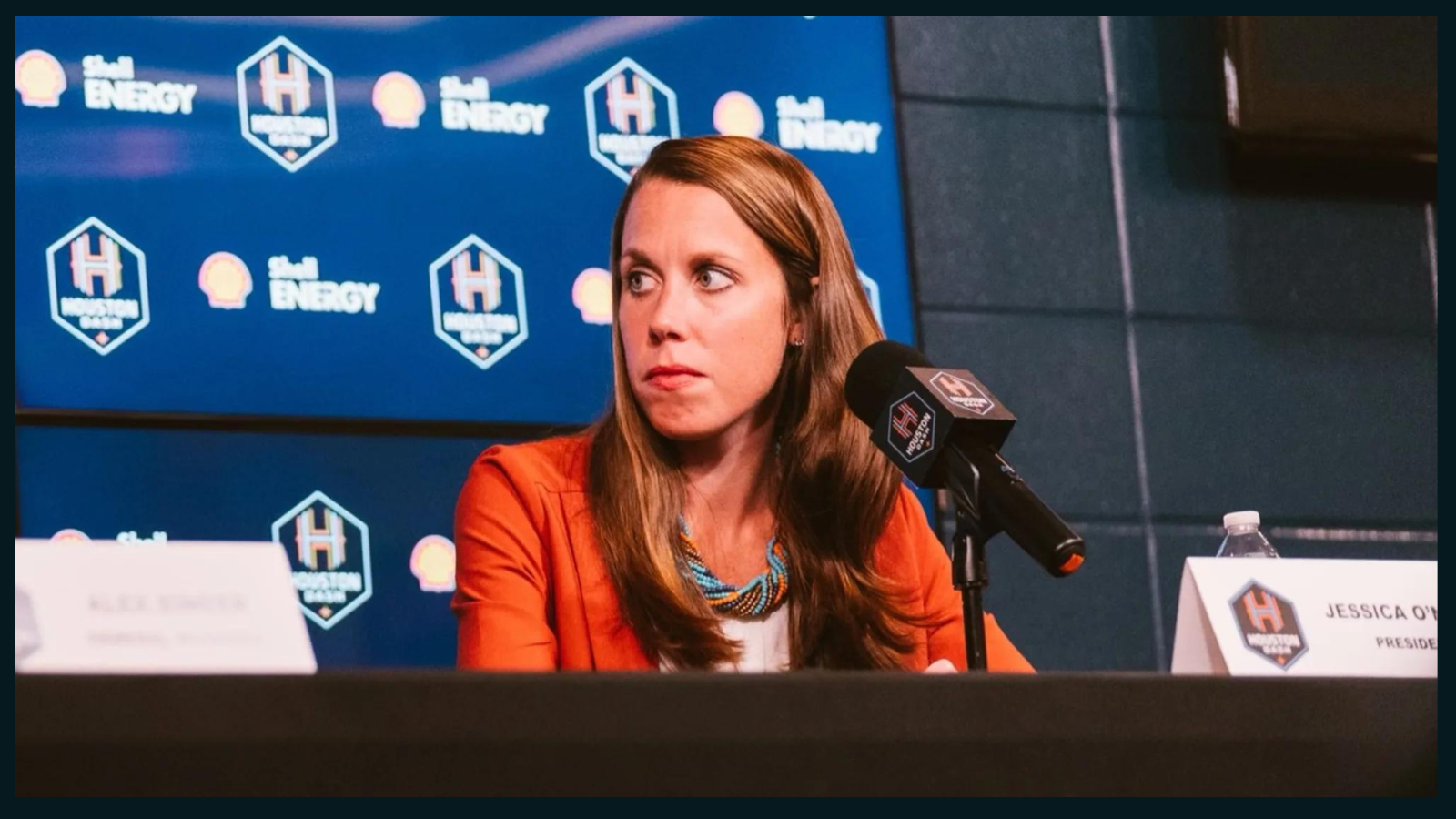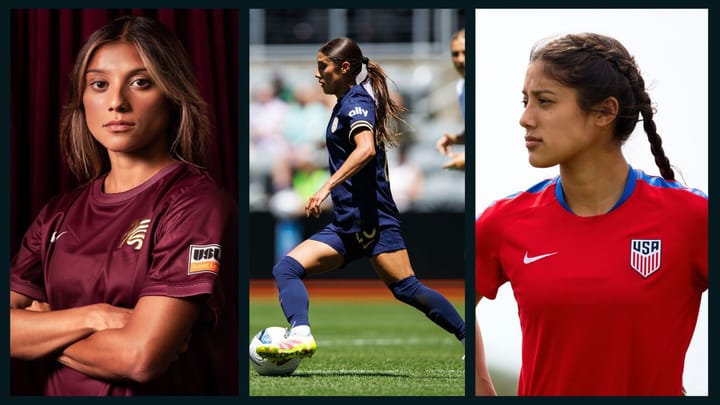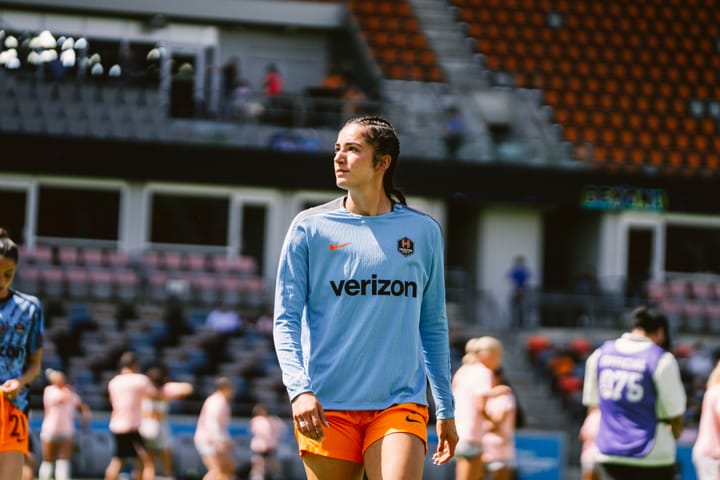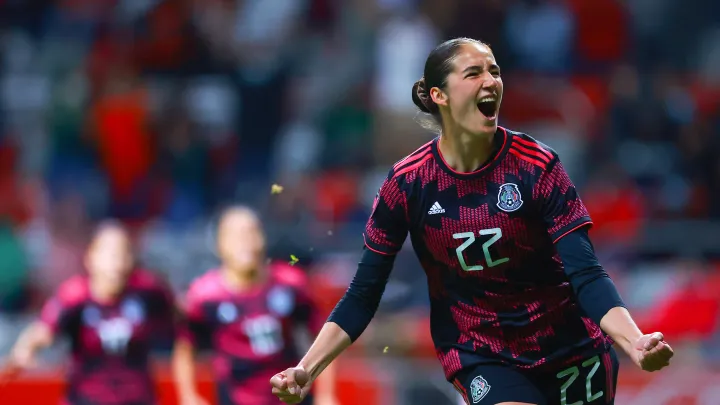'We are not where we want to be': Q&A with Houston Dash/Dynamo president Jessica O'Neill
A one-on-one conversation with the NWSL executive reflecting on the removal of the team's general manager.

On Friday, Houston Dash/Dynamo club president Jessica O'Neill made time for a quick telephone call with Squad Depth to elaborate on the decision-making process behind firing the club's first-ever general manager Alex Singer this week.
O'Neill has been with the Dash since February 2022. In that time she has overseen Houston's record home attendance and first-ever NWSL playoff appearance. She has also worked with three full-time head coaches, two interims, as well as the current acting head coach Ricky Clarke.
In addition to unpacking the club's leadership change at this moment, O'Neill touched on head coach Fran Alonso's leave of absence, the timeline for replacing Singer, and the Dash's recruitment strategy for the upcoming transfer window.
NOTE: This conversation has been lightly edited for length and clarity.
Squad Depth: Walk me through the decision to remove Singer yesterday, and how you approached the team with the news.
Jessica O'Neill: Yesterday was difficult, but then it also was progress. It's a difficult decision to arrive at – to make a change in a leadership role – and one I have been through a couple of times in my time here.
We are grateful for the time that Alex [Singer] gave us in her role as the first-ever GM for the Dash. That's an important milestone for us, and a lot of growth and progress in those two years. But we are not where we want to be on the field, and this was a soccer decision, it was a difficult decision, but a soccer decision to bring in a new leader, make a change in that role, and have a runway of time to do so.
When that part was complete in that discussion, I went out to the training field and I waited for the group to be done, and I got to spend time with our team. For the rest of the day, visiting with our staff one-on-one, and making sure that everybody has what they need in the short term.
SD: Who else were you discussing removing Singer with?
JO: I am in frequent communication with our ownership group. We added a new leader last week [Tim Howard], who is committed to both the Dash and the Dynamo. He has an amazing perspective and experience. And then, I talk quite frequently with Ted Segal, as the majority owner of the club.
SD: Why make a change at GM now, at midseason?
JO: It's twofold. One, we know the runway that proper [front office executive] searches take from a timing standpoint, and this gives us really two months - if we need the full two months - to do a proper search.
I told the team, I would like to have somebody in place by October. So, to have August and September to do that search is important. That gives someone time to prepare for the off-season and 2025. That was the main driver.
But also, you know how competitive this league is, we are five points behind the playoff line with 10 regular season games left, and I don't have to tell you, but that means there's still a chance. And you know, the culture of the ecosystem is really important. That was also something that we were cognizant of, is giving the group a chance to reset a bit.
SD: What kind of effect do you think Singer was having on the "culture of the ecosystem" at this moment in time?
JO: I appreciate the question. I do. Hopefully, you can appreciate, I want to be caring. The culture starts at the top. It starts with me. That's a responsibility, and that pressure is a privilege. I believe that every single day.
So, you know, it starts with me, and then it starts, you know, on the soccer-specific side, with our GM. So we are making sure that the group positively knows that we have their back.
I do think sometimes, and you've seen it, across global football, sometimes a change in leadership gives the team a chance to sort of reset. To show up the next day ready to go. There are a lot of examples of that.
SD: After the 2022 season, you became the president of both the men's and the women's clubs in Houston. Having previously been just the president of the women's side.
Will you look to hire an individual president for each, and/or a sporting director alongside a new GM?
JO: We continue to evaluate our structure and how it meets our ambitions on a regular basis. That's intentionally vague because that's in all areas of the business. That's in how our resources are set up, and how the dedicated resources are split.
So anything is on the table and the way that we evaluate that, I certainly don't have all the answers. I know I have the support of our ownership to make recommendations. And, I talk to my counterparts across both leagues [MLS and NWSL], but specifically in the NWSL, to make sure that we are resourcing the team the right way. And I have a couple of counterparts that have a similar role, in serving as president of both teams.
The plan is to hire a general manager to answer your other question, to fill that role that Alex [Singer] left.
SD: Having been at the club for two and a half years, what is your relationship like with the players?
JO: First, I want to say, this is such a great group of people.
You know, some of the pieces have changed. I was at our training facility much more often than I have been over the past two seasons. That was a natural evolution, as Alex [Singer] came in. The leaders of our soccer space should have the autonomy to lead in our soccer space. That is my view.
But I have a great relationship with a good group of players that I have known for a while. I think that there are newer faces. It's not as frequent that I'm able to talk to them, but that will change now. I think especially because we're in a transition time, it's really important that they see me more often. And, that they know I am available.
I have full confidence in the job that Ricky Clarke is doing as our acting head coach and have had a lot of communication lately with Ricky to make sure that he has what he needs. Ultimately, he's leading the shift day to day right now, and he needs to know that he has my support, and the players also need to know that.
SD: On head coach Fran Alonso, who has been absent for a month, what's the latest on him waiting to be "cleared" and what are the next steps?
JO: Sure, so leave of absence. As you've heard from us, he continues to serve on a leave of absence. One of the things I do want to clarify is that we have leave of absence policies for all of our employees that do specifically address what type of communication is appropriate from who, and when, and how, including what we share publicly.
The difference is that the head coach is a very public role, so not the same level of privacy that's available to somebody else in a position that might be less public, were they on a leave of absence. We continue to respect his privacy, and we continue to look forward to his return. I do not have a timeline for that.
SD: Does the departure of Singer change the responsibilities of technical director Pablo Piñones-Arce?
JO: So, thanks for bringing up Pablo because he's a part of the sort of collective approach right now. He and I are in frequent communication as of late to make sure that from a roster standpoint, as the trade window opens, as players might have questions about contracts, etc, that we address all of those.
Pablo has significantly more football experience than I do, so we'll work closely on that, including with [acting head coach] Ricky [Clarke]. He will be working closely with us, to sort of fill the gap [left by Singer].
SD: What is the Dash's transfer strategy right now?
JO: I will continue to be bullish, Theo. We will be a destination of choice, for the best in the world. That is on and off the field.
You know, last week we had the opportunity to welcome Tim [Howard], which is a great example of that, right? He chose Houston. We've had players, including Tarciane and Jane Campbell, who continue to choose Houston. And, in Jane's case, chose Houston out of others in the league. Teams that I am sure would have loved to add her to the roster.
From a recruitment strategy, I would say less football-specific, but more just players and staff have to want to make Houston their home. There are a lot of cities that folks are contemplating. Do they want to bring their families? Is it a place where they can see themselves? If they love the city, is the city going to love them back?
From my perspective, that's the best thing. The best opportunity we have is to make it very clear that Houston is and should be at the top of everyone's list.
SD: Over the past 23 months, do you think the Houston Dash has regressed?
JO: No, I do not think so. I think we have a ton of potential. We've made progress, but we haven't made enough progress to get to that potential as quickly as we would like to.




Comments ()